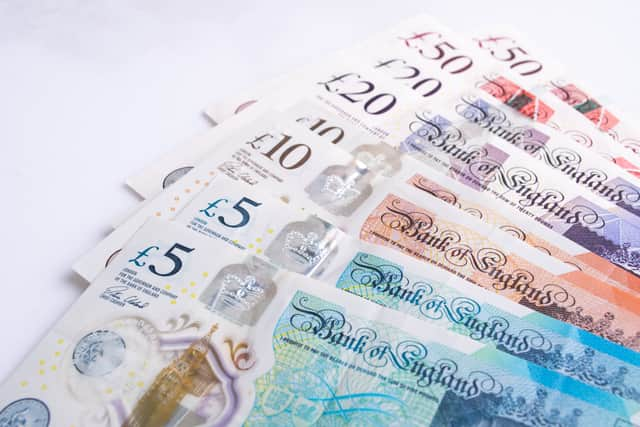UK national debt 2022: what is debt to GDP, how much interest does government pay and who do we owe money to?
and live on Freeview channel 276
For much of the period since the 2008 financial crisis, UK politics has been dominated by debates about the country’s finances.
Words and phrases like ‘the national debt’, ‘the deficit’ and ‘austerity’ have moved out of economics textbooks and into the mainstream.
Advertisement
Hide AdAdvertisement
Hide AdNow, with the cost of living crisis affecting households up and down the UK and the scale of the public spending needed to tackle the Covid pandemic becoming clearer, questions are once again being asked about the state of the public purse.
So what is the current level of national debt - and who do we owe money to?
Here’s what you need to know.


What does national debt mean?
National debt is the result of the Government running a budget deficit, i.e. spending more than it receives from taxes.
This might not sound like a good thing - after all a person who falls into debt risks losing all of their personal assets if they fail to pay it back.
Advertisement
Hide AdAdvertisement
Hide AdBut at a national level, debt can actually be useful and is described by the International Monetary Fund (IMF) as “an important way for governments to finance investments in growth and development”.


Problems with debt only tend to arise if a country becomes unable to service its debts, for example if interest on repayments increases at a much faster rate than the country’s income.
If this happened, you would see big cuts to public spending, for example on services.
Who does the UK owe money to?
To be able to run a deficit, the Government has to borrow money from the private sector.
Advertisement
Hide AdAdvertisement
Hide AdThe Government does this by issuing its own bonds - also known as gilts.
When it needs extra cash, it hosts bond auctions where banks and other financial institutions buy bonds to sell them on to other banks, pension funds and individual investors.
Bonds can be looked at in two ways - as requests for investment or loan agreements.


Either way, when the Government issues them, it agrees to pay them back at a particular level of interest over a particular period of time.
Advertisement
Hide AdAdvertisement
Hide AdUsually, these are considered to be low-risk investments as they guarantee regular repayments for the investor/lender over what tends to be a long period of time.
But they do carry some risks for lenders/investors - for example, when inflation rises sharply, interest on the bonds can be outstripped if they are not index-linked, meaning the investor/lender loses money.
What is the UK national debt?
Debt is usually expressed as a percentage of gross domestic product (GDP) - i.e. the amount of value a country creates through producing goods and services in a year.
This is because debt as a number on its own means nothing at all without a comparison to how much the country essentially earns.
Advertisement
Hide AdAdvertisement
Hide Ad

According to the Office for National Statistics (ONS), the UK’s net national debt sat at £2.3 trillion as of February 2022.
This figure is 94.7% of GDP, meaning national debt is sitting at a similar level to where it was in the early 1960s.
Loading....
But it is lower than it was for the 2020/2021 financial year when it rose to 103.7% of GDP (20% up on the year before) as a result of record Government borrowing during the Covid pandemic.
This borrowing was needed to finance the furlough scheme and other economic support.
Advertisement
Hide AdAdvertisement
Hide AdWhile national debt has been at its highest level for decades, it pales in comparison to where it was after World War Two when it sat at 230% of GDP.


The Office for Budget Responsibility (OBR) believes debt will not fall to pre-pandemic levels until 2026/2027.
How much interest does the UK pay on national debt?
While the size of the national debt is key, how much it costs to service it is also vital.
At the moment, because the interest paid on index-linked bonds is connected to retail price index (RPI) inflation, the UK is paying more in interest.
Advertisement
Hide AdAdvertisement
Hide AdFor example, during the month of February interest payments totalled £8.2 billion - up from £5.4 billion in the same month last year.
Borrowing is set to drop as the pandemic, at the present moment at least, looks set to become less of a burden on public finances.
The OBR believes it will fall 60% from the £322 billion (15% of GDP) seen in 2020-21 to £128 billion (5.4% GDP) in 2021-22.
But the cost of borrowing is set to increase as a result of rocketing inflation, meaning interest payments are forecast by the OBR to hit £83 billion in the 2022/2023 financial year.
If this happens, it would be a record high in real-terms and a 36-year high in terms of how big interest is compared to GDP (3.3%).
Comment Guidelines
National World encourages reader discussion on our stories. User feedback, insights and back-and-forth exchanges add a rich layer of context to reporting. Please review our Community Guidelines before commenting.
